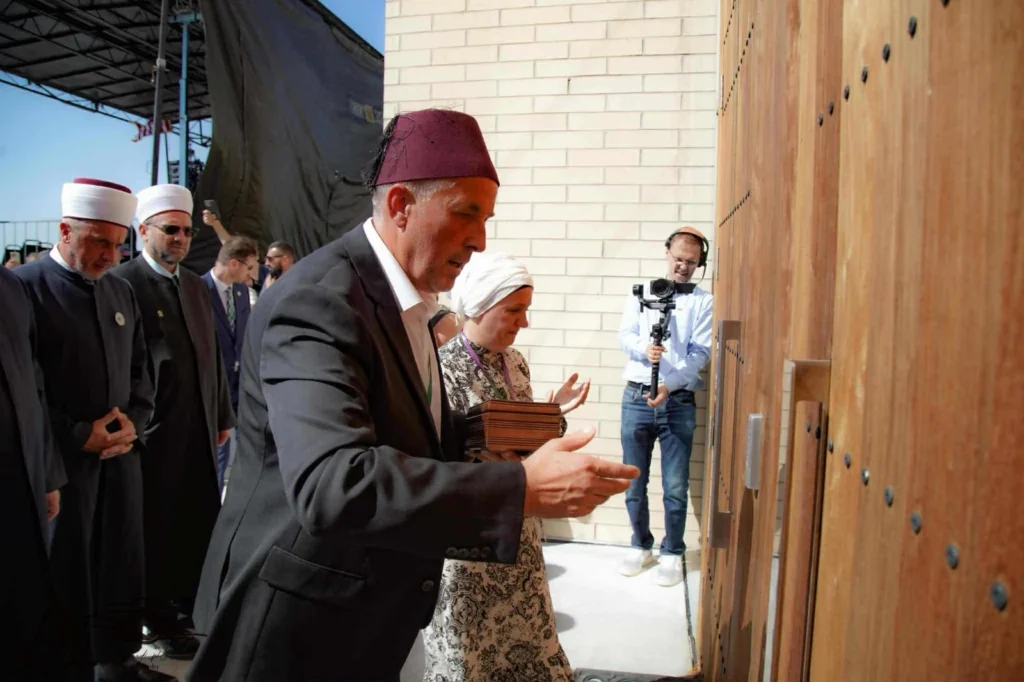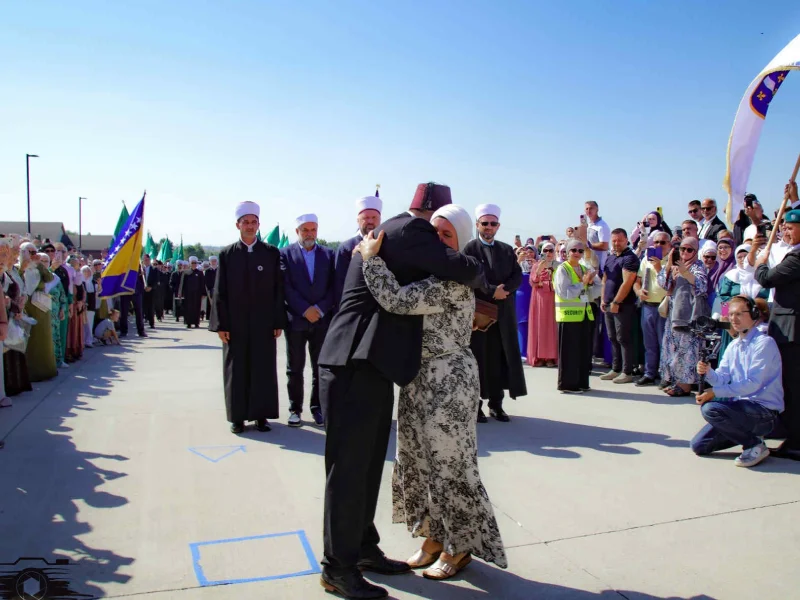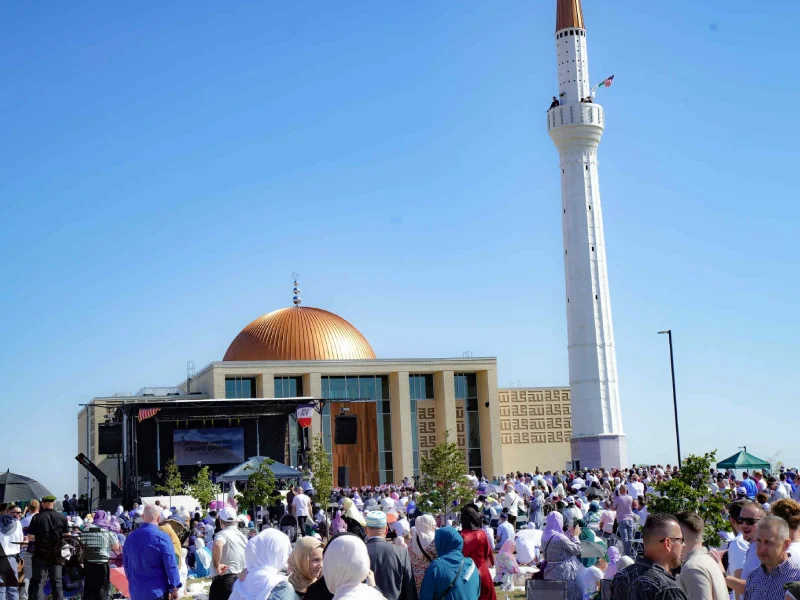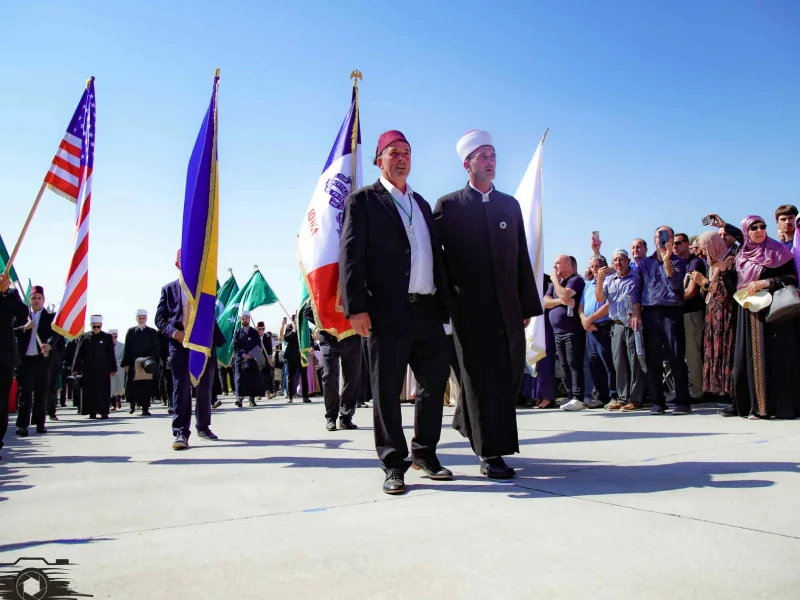On September 27, 2025, in front of thousands of people from different parts of the world, the Es-Selam Mosque of the Bosnian Islamic Cultural Center in Granger, Iowa (USA) was officially opened. The event brought together distinguished figures from religious and political life: Mayor of Des Moines, Toni James; Senator Sarah Trone Garriot; Professor Kathleen Spellman of Columbia University; Catholic Bishop William Johnson; as well as representatives of other faith communities. On behalf of the Islamic Community, addresses were given by Mufti Prof. Dr. Mevludin Dizdarević, American Mufti Dr. Sabahudin Ćeman, Chief Imam Muaz ef. Redžić, and Es-Selam mosque’s imam, hafiz Nermin ef. Spahić. The ceremony was moderated by artist Mirza Mušija.
This event represented the culmination of many years of effort, dedication, and sacrifice of the entire community, led by Elvedin Sivac and imam hafiz Nermin Spahić, who were the pillars of this great project. The mosque committee decided that the opening honor would go to its president, Elvedin Sivac. Instead of taking this moment of recognition solely for himself, he chose to share the honor with his wife, Beisa Kuburaš-Sivac. Though seemingly a simple gesture, it carried profound messages about marital partnership, equality, and a true understanding of Islamic values.

Back in 2004, Elvedin and Beisa began the demanding mission of organizing and bringing together the Muslim community in Des Moines, Iowa. In a foreign land, where preserving identity and faith is often more challenging, they joined forces to create a space for future generations – a place of worship, education, and community. It was no easy task. Beyond financial obstacles, they faced psychological and social challenges inherent in any collective effort. Before the opening, Elvedin shared with a smile: “We have endured much, but our hearts are at peace because we know everything was done for the sake of Allah.” That, ultimately, is what matters most, while human ego, envy, and hypocrisy must be set aside. The essence lies in competing in good deeds, just as the Almighty commands: “So compete with one another in good deeds” (5:48), and “So strive together as if in a race towards all that is good” (2:148).
The strength of this couple lay precisely in their ability to work side by side, encouraging one another and persevering when others gave up. Their model of partnership is not one of rivalry but of complementarity. As president of the mosque committee, Elvedin could have easily highlighted himself as the central figure, as unfortunately is often the case in Muslim communities. Instead, he emphasized the importance of joint work with imam Nermin Spahić and the many male and female benefactors (vakifs). Then he added words that moved many to tears:
“It was a great honor for me to open the Es-Selam Mosque. With me was my beloved Beisa, my greatest support, my anchor, and my answered prayer. Her strength and quiet resilience were my guide, and her heart was my peace. Together with our two daughters, Hatidža and Ajdina, in whose eyes I saw the fruits of blessing and the strength of love, this moment became the crown of our shared journey.”

By publicly recognizing his wife’s contribution, Sivac demonstrated that true strength does not lie in self-promotion but in acknowledging shared effort. He showed what it means to be both a true gentleman and a believer: one who does not claim a monopoly on recognition but understands that success is born of collective and collaborative work. His act stands in contrast to the notion that only men are “God-given” to receive praise and honor.
Unfortunately, his gesture remains the exception rather than the rule. Too often in Muslim communities, men forget that their achievements are not theirs alone but also the result of the support of family and spouses. A simple review of various ceremonial events shows that men are the ones most frequently recognized, while women are often left unmentioned and forgotten in speeches, unacknowledged by title, referred to only as someone’s wife, daughter, or sister, rather than as doctors, professors, engineers, or benefactors (vakifas). In patriarchal contexts where men occupy the central stage, women’s contributions are taken for granted and rendered invisible. Yet, if a man’s title or smallest contribution is overlooked, criticism and protest quickly follow.
This reveals a fundamental truth: it is essential that every voice and every contribution be recognized. As the Qur’an reminds us:
“Whoever does good, whether male or female, and is a believer, We will surely grant them a good life, and We will reward them according to the best of what they used to do.” (16:97)
Goodness, therefore, is valued as a universal category, regardless of gender, social position, or status. God makes no distinction between male and female contributions but rewards effort, intention, and sincerity. In practice, however, within Muslim societies, women’s voices have been muted, and their contributions either neglected or attributed to men in the public sphere. At the opening of the Es-Selam mosque, one man showed that things can and should be different.
Since the Es-Selam mosque was built as a waqf (endowment) funded by numerous male and female donors, it is especially positive that their names are inscribed on the mosque’s minaret, a symbolically important act. In the history of waqfs in Bosnia and Herzegovina, women made significant contributions, yet they are rarely mentioned. At mosque openings, for example, great benefactors such as Gazi Husrev-bey are frequently cited, but not his wife Shahdidar, despite existing records of her substantial endowments in Sarajevo. Likewise, women benefactors from Islamic history are often overlooked, such as Zubayda, the wife of Caliph Harun al-Rashid of Baghdad, who built the water supply system for Mecca. Seeing the city’s water shortage, she hired experts to design the most advanced irrigation system of her time. Years ago, while on Umrah traveling toward Mecca, one of the guides emphasized Zubayda’s contribution, noting that even today engineers cannot fully explain how her waterworks functioned because of its complexity. My comment at the time was: “Appoint a woman as mayor of Mecca, and the water supply will work again.”
A Message to the Community and Future Generations
The example of this gentleman benefactor transcends a personal story and becomes a symbol for the whole community. Firstly, Elvedin sends a powerful message about the importance of women in religious and social life. Members of this congregation, such as Beisa Kuburaš-Sivac, Dr. Jasmina Salčinović-Spahić, Elvira Jukić, Elma Berbo, Sena Delahmet, and others are often the bearers and initiators of important initiatives, even though their names rarely reach the public. By publicly acknowledging their contributions, barriers of silence and invisibility are dismantled, creating space for equal recognition of men and women in the Bosnian diaspora community.
Secondly, he offers a model for future generations: marriage is not merely a private institution but also a platform for joint work and social contribution. Shared faith can become the foundation for broader social projects, and the opening of the Bosnian Islamic Cultural Center mosque is the best proof of such a vision. Islam, from its earliest beginnings, granted women the right to own property, seek education, and participate in society. Yet throughout the centuries, practices developed that marginalized women, confining their roles mainly to motherhood and the private sphere. Today, when women are often as educated, or more educated than men, it is unacceptable to disregard and exclude half of the intellectual and social capital simply out of habit or unwillingness to change. Had Prophet Muhammad (peace be upon him) behaved that way, he would never have transformed the customs and traditions of Mecca and Medina, even though he was told repeatedly that people were merely following “the ways of their forefathers.” Traditions can be beautiful, but they must always be refined and renewed lest they ossify into sterile and unproductive habits.
What Elvedin Sivac did can be understood as a return to the original Islamic values where women’s contributions are recognized and appreciated. By reminding the community that the mosque was not solely the product of one man’s effort, but of an entire community and in this case, of two people who shared dreams and responsibilities, Elvedin points directly to the qur’anic message that husband and wife are: “garments to one another”, comfort, support, protection, and guidance to each other. His decision to share the honor with his wife is not merely an act of momentary humility or sentiment but a lasting lesson in what leadership in the community should look like. A leader is not one who monopolizes power and recognition but one who makes space for others, especially those whose contributions are essential yet often hidden, whether by neglect or by deliberate omission.

The story of Elvedin and Beisa is more than the account of one mosque’s opening. It is testimony to shared effort, the strength of partnership, and values that transcend individual ambition. It sends a message to the community that success is fuller when shared, and that the highest honor lies not in self-promotion but in acknowledging and valuing others.
At a ceremony attended by people from around the world, Elvedin Sivac did more than open the doors of a new mosque. He showed Muslims how gender relations in religious and social life should be understood. His action stands as a reminder that partnership, humility, and mutual respect remain the foundations of true success in faith, as in life.


